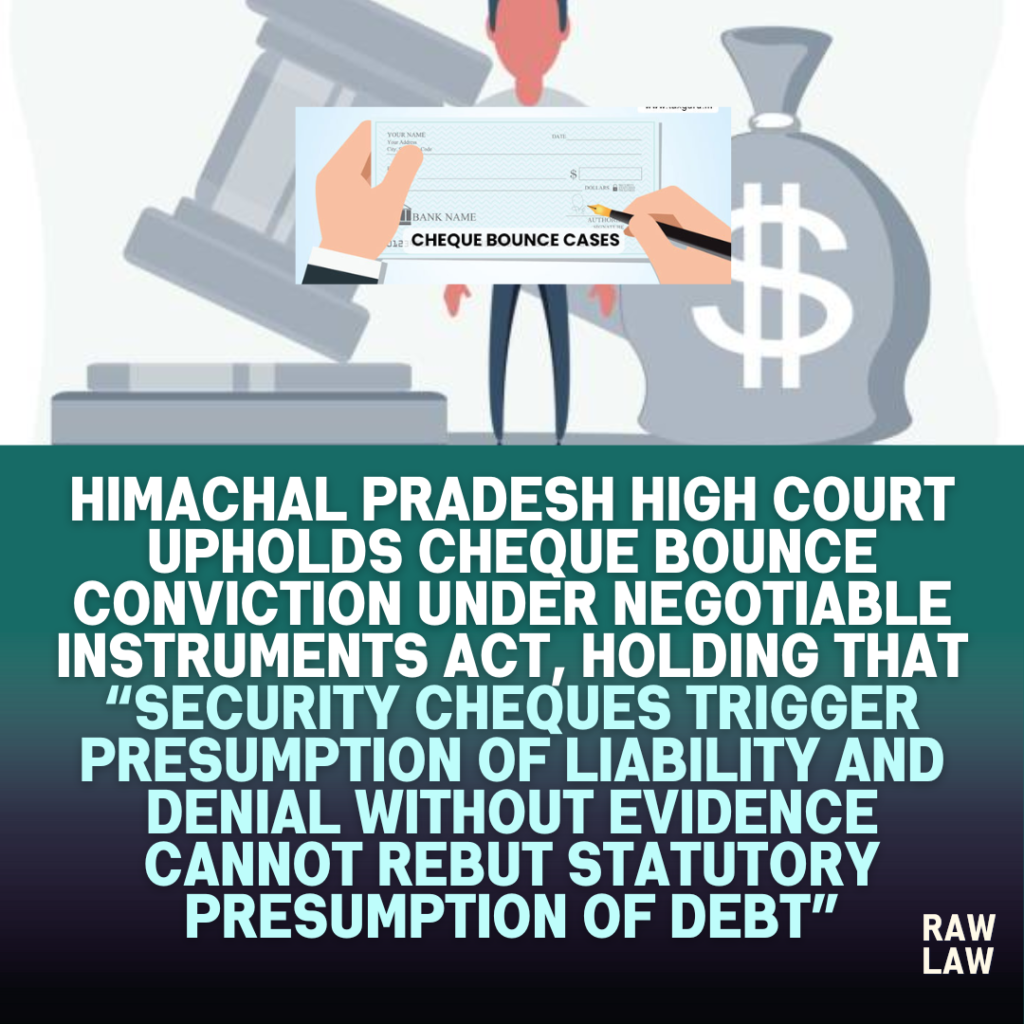Court’s Decision
The Himachal Pradesh High Court dismissed the criminal revision petition, upholding the conviction and five-month simple imprisonment with compensation of ₹13,00,000 under Section 138 of the Negotiable Instruments Act. It ruled that the admitted signature on the cheque triggered the statutory presumption of legally enforceable debt under Sections 118 and 139, and the accused failed to rebut this presumption with cogent evidence. The court held that security cheques can also form the basis of liability if the underlying debt remains unpaid.
Facts
The complainant, a bank, granted a car loan of ₹4,54,020 in 2006 to the accused, who defaulted, leading to outstanding dues of ₹7,28,838.72 by 2010. A cheque of ₹7,00,000 was issued by the accused towards this liability, which was dishonoured for “insufficient funds.” Despite receiving statutory notice, the accused failed to repay, resulting in a complaint under Section 138 of the NI Act. The accused claimed the cheque was a blank security cheque misused by the bank, argued about insurance claims not being adjusted, and asserted partial payments, which were not credited.
Issues
- Whether a cheque issued as security but dishonoured due to insufficient funds can sustain conviction under Section 138 of the NI Act.
- Whether the presumption under Sections 118 and 139 can be rebutted by claims of security cheque misuse and partial payments without evidence.
- Whether the High Court, in revision, can reappreciate evidence in such cases.
Petitioner’s Arguments
The petitioner argued that:
- The cheque was a blank security cheque misused by the bank.
- The bank received an insurance claim but did not adjust it against the dues.
- Partial payments made by the accused were not credited.
- The complainant failed to prove a legally enforceable debt of ₹7,00,000 on the date of presentation.
- The lower courts erred in failing to consider these aspects, warranting setting aside the conviction.
Respondent’s Arguments
The complainant (bank) contended:
- The accused admitted taking the loan and issuing the cheque.
- The cheque was dishonoured for insufficient funds, and statutory notice was duly served.
- The accused failed to produce any evidence to rebut the statutory presumption under Sections 118 and 139.
- Claims of misuse of a security cheque and non-adjustment of insurance amounts were unsubstantiated.
Analysis of the Law
The court analysed:
- Sections 118 and 139 NI Act: Presumption of consideration and enforceable debt on cheque issuance unless rebutted.
- Triyambak S. Hegde, Basalingappa, Kalamani Tex, Bir Singh, Sumeti Vij: Presumptions under Sections 118 and 139 are rebuttable, but require credible evidence.
- Sampelly Satyanarayana Rao, Sripati Singh: Security cheques can attract Section 138 if the debt remains unpaid.
- Malkeet Singh Gill, Dilipsinh Rao, Kishan Rao: Revisional jurisdiction is narrow; reappreciation of evidence is not permissible unless there is perversity.
Precedent Analysis
- Triyambak S. Hegde, Kalamani Tex, Basalingappa: Establish statutory presumption of debt on admitted signature unless rebutted with evidence.
- Sampelly Satyanarayana Rao, Sripati Singh: Security cheques can sustain conviction if debt exists.
- Malkeet Singh Gill, Kishan Rao: Revisional jurisdiction cannot substitute factual findings unless there is perversity or miscarriage of justice.
- Mandvi Cooperative Bank: Bank memos on dishonour are presumed correct unless rebutted.
Court’s Reasoning
The court noted:
- The accused admitted the loan and did not dispute the signature on the cheque.
- No evidence was led to prove claims of misuse or repayment.
- Alleged insurance adjustment and partial payments were unproven.
- The cheque’s dishonour for “insufficient funds” was supported by the bank memo, and the statutory notice was duly served.
- Under Sampelly Satyanarayana Rao and Sripati Singh, a security cheque can trigger liability if the underlying debt subsists.
- Revisional jurisdiction could not be invoked to reappreciate evidence absent perversity.
Conclusion
The Himachal Pradesh High Court:
- Dismissed the revision petition and upheld the conviction and sentence.
- Held that the presumption under Sections 118 and 139 remained unrebutted.
- Affirmed that security cheques attract liability under Section 138 if the debt remains unpaid.
Implications
- Confirms that admitted signatures trigger statutory presumptions under NI Act.
- Clarifies that security cheques can sustain convictions under Section 138 if the debt is unpaid.
- Reinforces the limited scope of revisional jurisdiction in cheque bounce cases.
Short Note on Cases Referred
- Triyambak S. Hegde, Basalingappa, Kalamani Tex: Statutory presumption unless rebutted with evidence.
- Sampelly Satyanarayana Rao, Sripati Singh: Security cheques can be presented for recovery if debt subsists.
- Malkeet Singh Gill, Kishan Rao: Revisional jurisdiction is limited.
- Mandvi Cooperative Bank: Dishonour memos presumed correct unless rebutted.
FAQs
1. Does a cheque issued as security attract liability under Section 138 if dishonoured?
Yes, if the debt subsists, a dishonoured security cheque can sustain conviction under Section 138.
2. Can denial without evidence rebut the presumption under the NI Act?
No, mere denial or unsubstantiated claims cannot rebut the presumption; credible evidence is required.
3. Can the High Court reappreciate evidence in revision in cheque bounce cases?
No, unless there is perversity, the High Court will not reappreciate evidence in revision.
